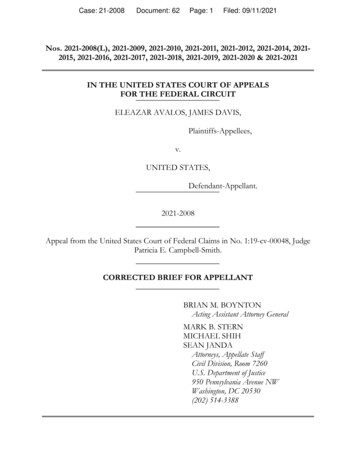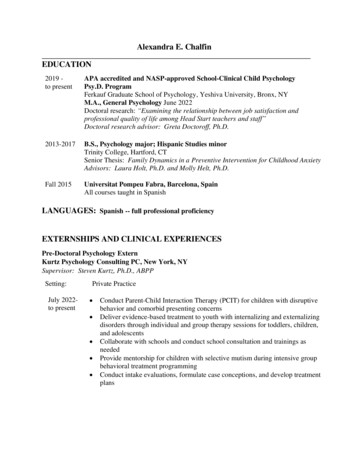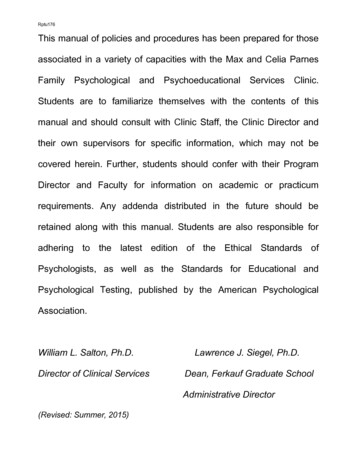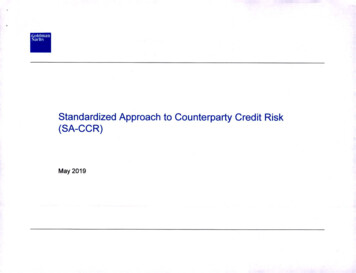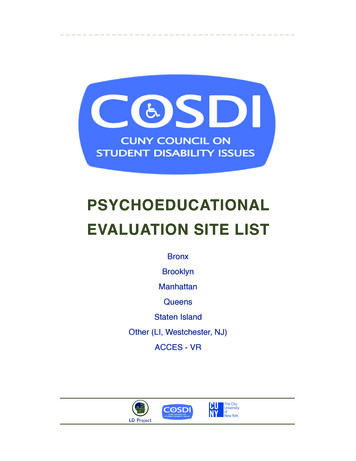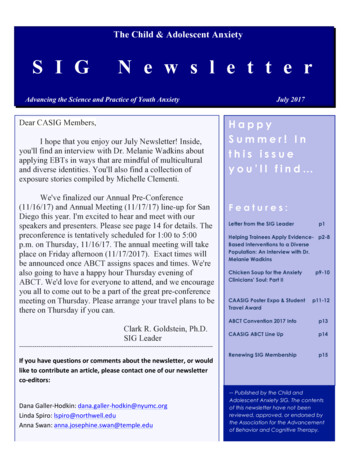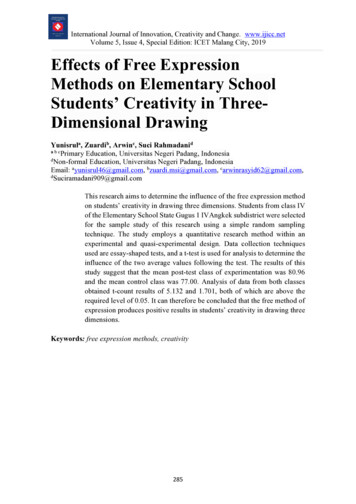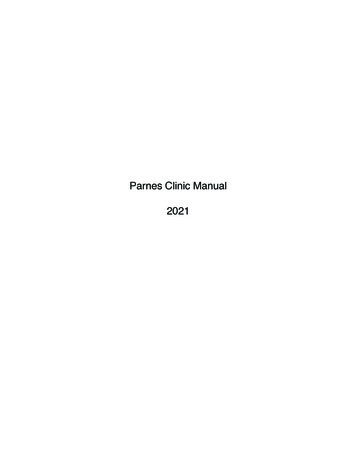
Transcription
Parnes Clinic Manual2021
This manual of policies and procedures has been prepared for those associated in a variety ofcapacities with the Max and Celia Parnes Family Psychological and PsychoeducationalServices Clinic. Students are to familiarize themselves with the contents of this manual andshould consult with Clinic Staff, the Clinic Director, the clinic Post-Doctoral Fellow and theirown supervisors for specific information, which may not be covered herein. Further, studentsshould confer with their Program Director and Faculty for information on academic or practicumrequirements. Any addenda distributed in the future, either in “Canvas Posts,” or the annual“Welcome Back Letter” should be retained along with this manual. Students are alsoresponsible for reading, owning and adhering to the latest edition of the Ethical Standards ofPsychologists, as well as the Standards for Educational and Psychological Testing, publishedby the American Psychological Association.William L. Salton, Ph.D.Leslie Halpern, Ph.D.Clinical ProfessorDean and ProfessorDirector of Clinical ServicesFerkauf Graduate SchoolParnes ClinicFerkauf Graduate School(Revised: Summer, 2021)3
Other Members of the Clinic CommitteeKenneth Critchfield, Ph.D.Director, Adult Clinical Psychology ProgramJonathan Feldman, Ph.D.Director, Clinical Psychology Program (Health Emphasis)Michael Gill, LMHCDirector, LMHC program.William Salton, Ph. D.Acting Director, LMFT ProgramMelanie Wadkins, Ph.D.Director, School-Clinical Child Psychology Program
CONTENTSEthical Principles . . .5Mission. . . . . .5Diversity Statement 5General Information. . . . . .6Primary Contacts . 7Key Terms and Resources . 9Services Offered. . . .11Treatment . . . 12Supervision. . 17Privacy Practices of the Parnes Clinic . . .18HIPAA Security Rule . . . 20Professional Conduct And Center Policies. . . . . 22Center Process/Client Flow. . . . 29General Instructions for Intakes in All Psychotherapy Practica . .31Specific Intake Procedures for 1st Year Clinical Program (Psy.D.) Students . 36Other Clinic Procedures .37Scheduling Appointments/Room Usage. . . . 40Telephone Concerns/Messages. . . . . 42Student Responsibilities. . . . .44Fees . . . . . .47Payment of Bills. . .483
Insurance .49Testing Materials Policy. . . . . 49Emergencies And Other Clinical Situations. . . . . . 51Special Considerations Regarding Clinical Documentation . . 62Security Problems. . .68Appendices . . .694
ETHICAL PRINCIPLESAs all individuals who provide services through the Parnes Clinic are obligated to abideby the Ethical Standards of the American Psychological Association, a copy of the APA’sPrinciples of Psychologists and Code of Conduct is in Appendix A.MissionThe Max and Celia Parnes Family Psychological and Psychoeducational Services Clinicprovides a variety of psychological services to individuals and their families, both in the Bronxand the Greater New York City communities. We are also the teaching and training center of theFerkauf Graduate School of Psychology of Yeshiva University. Our mission is to offeraffordable, state-of-the-art psychological care to everyone we serve. We accomplish this byproviding a wide range of evidence based supervised therapies to a broad-based population,especially those who cannot otherwise afford or access these services within their communities.This mission has been expanded in the Parnes Clinic’s 2020 adaptation to remote telehealthservices. Parnes is now a fully hybrid clinic that serves our patient population in person and viatelehealth. This is in line with our mission for social justice because we are able to help thepeople that we serve irrespective of their resources.Diversity StatementThe Parnes Psychology Clinic welcomes individuals of all backgrounds and aspects ofidentity, including race, ethnicity, nationality, immigration status political party, culture, sex (or5
sex assigned at birth), gender, gender identity, sexual orientation, class, religious belief andnon-belief, and level of ability/disability. We recognize that our training program and clinic staffare embedded within a larger culture that includes values, beliefs, biases, and practices thatroutinely advantage some individuals and disadvantage others. We explicitly disavow and striveto work against differential treatment of people on the basis of these and other factors that areoften prejudged by the larger culture.Our commitment is to treat our clients with respect, act in ways that build trust, and honor thetrust placed in us. We are open to perspectives that are different from our own. We support ourclients’ efforts to engage in and repair relationships. We believe that prioritizing one's personalidentity and values alongside evidence-based treatment will promote the relief of suffering andprogress towards therapeutic goals.We understand that during times of social, political, economic, and environmental strife, it issometimes difficult to feel seen and heard. The Parnes Clinic is committed to creating a spacefor clients to express personal concerns, explore their values, and find ways to make theirvalues come to lifeGeneral InformationThe Parnes Clinic is located at the Van Etten Building, 1225 Morris Park Avenue, 5th floor.The facility is informally known as the "Psychology Clinic." The telephone number is (646) 592-4399.The clinic and the clinic office are open Monday through Thursday from 9:00 a.m. to 8:00p.m. and Friday 9:00 a.m. to 2:00 p.m. A graduate student provides evening office coverage except6
during the winter recess. The Clinic is closed in observance of general and Jewish holidays.Students should consult the yearly clinic calendar which is posted throughout the clinic and onCanvas for specific calendar information. Please note that the clinic calendar does not correspondexactly to the graduate school's academic calendar. Patients, other than those seen through Dr.Zweig’s Gero-Psychology Practicum, are seen September through the end of July unless specialarrangements have been made with the clinic director. Patients seen through the Gero-PsychologyPracticum are seen September through August.Primary ContactsClinic Director: Dr. William Salton. The clinic director is responsible for all clinical and administrativeoperations of the Parnes Clinic. S/he meets with all new Parnes student therapists to help orientthem to the clinic (within the context of their practicum classes) and is always available to everyoneat Parnes; either in person, or by email, telephone or pager. The clinic director is a member of eachgraduate faculty at Ferkauf and attends meetings regularly to brief faculty on clinic “happenings” anddiscuss individual student’s issues. Finally, it is the clinic director’s responsibility to represent theclinic in the community, either to referral sources, or in a public relations capacity.Clinic Administrator: Marilyn Gotay. The clinic administrator is the main “face” of the Parnes clinic.S/he is the person whom every patient interacts with on arrival and departure, and is the “voice” onthe clinic phone during the day. S/he also keeps the clinic running smoothly by interacting with suchuniversity departments as maintenance, housekeeping, and IT. Finally, s/he is responsibleassembling and maintaining for the paper charts and keeping track of the money which flows in andout of the clinic.Postdoctoral Fellow: The Parnes Postdoctoral Fellow (“Parnes Postdoc”) works under thesupervision of the Clinic Director to support the day-to-day Parnes Clinic activities as well as engage7
in contact with all graduate programs. The postdoctoral fellow works September- August and is atthe clinic on Monday through Thursday from 12:00pm to 8:00pm. The Parnes Postdoctoral fellowhas primary responsibility for all clinical activities in the evening hours. S/he does not work on Fridays.Clinic TAs: The Parnes clinic, which serves over 500 patients and trains over 50 students annuallycould not function effectively without at least 19 TAs to keep it operating smoothly. Their variousroles and functions are described below:-Practicum TAs: All services offered at the clinic are correlated with practica within theirgraduate programs. They include: child Cognitive Behavioral Therapy (CBT), childpsychodynamic therapy, behavioral medicine therapy, adult psychodynamic, adult CBT, andthe Ferkauf Older Adult program (FOAP) as well as child and adult psychologicalassessment. The TAs for these practica are tasked with keeping them running smoothly,including patient assignment, patient flow, and chart review.-Screening TAs: Both the child and adult Psy.D. programs have “screening TAs” who areresponsible for conducting telephone “screeners” with prospective patients and presentingthem to the clinic director, or the clinic postdoc.-Playroom TA: The playroom TA maintains the three playrooms and two toy closets andorders supplies with the clinic director when necessary.-Assessment TAs: Assessment TAs in the child and adult Psy.D. programs oversee theoperations of each assessment track and screen patients for appropriateness with the clinicdirector.-Technology TA: The technology TA ensures that the various technologies at the clinicincluding (but not limited to) VALT, Hushmail, Google suite and the Electronic MedicalRecord (EMR) are up to date and running well. S/he also interfaces with the University’s IT8
department when necessary.-Outreach TA: The outreach TA works within the local Bronx community to be sure that theParnes Clinic is “known”. S/he also liaisons with community agencies to recruit patients forParnes.-Evening Desk Coverage TAs: These TAs cover the clinic desk in the evening and provideanother “public face” for the Parnes ClinicParnes Psychiatrist: Dr. Felice Perlman. The Parnes Psychiatrist works with some of our patientsone day a week (usually Wednesdays) to manage their psychiatric care. All Parnes patients whomay want to consult with our psychiatrist must be presented to the Clinic Director or Parnes Postdocfor screening, due to our psychiatrist’s limited availability.EMR Tech Support: Michael Potenza. Our EMR was created and is maintained by a companycalled “Point and Click.” The EMR Tech support for Point and Click serves to maintain all EMRfunctioning. He works with the Clinic Director and the Parnes Postdoc to problem solve and supportall EMR operationsKey Terms/ Resources/General IssuesClient/ Patient: These terms will be used interchangeably throughout this manualIn-Person Therapy Terms: VALT: VALT is the in-person video recording and storage system utilized at Parnes.Instructions about how to use VALT and share videos with your supervisor is available onCanvas and in Appendix B. File Room: This is where files are stored at ParnesoCharts/Files: These are patients’ paper files that are maintained at Parnes. Please9
note that both physical and electronic records are still maintained at Parnes, and filecharts store signed consent forms, supervisor logs, reports, etc. We also store“large charts” in the file room for patients who began their treatment before weinstituted our EMR in 2016. Voicemail Services: All students who work with Parnes patients have access to a voicemailservice through which they can receive calls. These voicemailboxes are sometimes sharedamong students. Students are not to make outgoing calls from their personal numbers Chart Number: All patients are assigned a chart number, in the format of (Year of ScreenerNumber). This number is consistent between the paper chart and electronic charts.Remote Therapy Terms: Parnes Google Suite: This is the HIPAA compliant telehealth platform used by Parnes. TheGSuite includes Google Meets (telehealth platform), Gmail (for secure emailing), GoogleDrive (for secure storage of recorded sessions), Google Calendar, etc. Please note thatstudents are only permitted to use the Parnes GSuite for Parnes business, (NOT personalGmail, externship Gmail, or YU email). Instructions on how to use G-suite are available inappendix C. Hushmail: Hushmail is the HIPAA complaint email platform used to facilitate sending andsigning patient forms. Instructions on how to use Hushmail are available in appendix D. EMR Chart: This is the chart through which the Screener, Intake, Progress Notes, ContactNote, Termination Report, financial records, etc. are stored.oEMR Chart Number: All patients are assigned a chart number, in the format of(Year of Screener-Number). This number is consistent between the paper chart and10
electronic chart.Online Resources: Canvas: This online tool is the resources for students to access real-time clinic updates,find clinic resources (i.e., forms, instruction sheet, Welcome Back letter etc.) the ParnesClinic canvas page should be checked regularly. Student clinicians will also get emailswhen there are new Canvas posts which must be read immediately because they oftencontain important and timely clinic information. This is also the main vehicle by which theclinic director communicates with the Parnes therapists and Ferkauf faculty. It is thepracticum TA’s responsibility to provide the Canvas link to each of the students in thepracticum.Please note: It is quite possible that every Parnes Clinic policy and procedure may not be depictedin this manual, since new issues always develop over time. Hence, if student clinicians have anyquestions about what goes on at the clinic, they should always feel free to consult the ClinicDirector, Clinic postdoc, TAs, or any member of the clinic staff.Services OfferedThe Parnes Clinic provides services to child, adolescent, adult, and elderly clients who areexperiencing a wide range of problems. Our patients range in age from 2 years old (in the PCITprogram) to 100 years old (in the geriatric psychology program). Services are offered to individuals,couples, families, and some specialized groups, such as people with medical and psychologicalailments, and people seeking political asylum. Since the Parnes Clinic is a training clinic, we havestrict inclusion and exclusion criteria for our patients, so that we can ensure that we provide the levelof services that would be most helpful for each one. Specifically, we do not treat individuals who are11
actively suicidal or homicidal, actively abusing drugs or alcohol, or who have unstable psychoticdisorders, such as acute schizophrenia. Since our psychological services are provided by students,we do not offer services to individuals who have an active legal case, who are experiencing currentdomestic violence or current child abuse/neglect or sexual abuse, or who have an open case withthe Administration for Children’s Services (ACS).Services are provided through several different programs housed within the Parnes Clinic.Doctoral students from the Clinical Program (Psy.D.), School-Clinical Child Program (Psy.D.) andClinical Program (Health Emphasis) (Ph.D.) as well as some Masters’ level students from the MentalHealth Counseling (LMHC) Program and the License in Marriage and Family Therapy (LMFT)Program provide services to patients at the Clinic.TreatmentAdult ServicesPsychodynamic Program (Clinical Program, [Psy.D.])Psychodynamic psychotherapy is a treatment that focuses on understanding a person’s characterand life history in order to provide insight into his or her problems and improve overall level offunctioning. Common difficulties addressed include depression, problems with self-esteem,relationship issues, post-traumatic stress adjustment disorders, anxiety, and bereavement. ClinicalProgram (Psy.D.) students taking the Psychodynamic Psychotherapy Practicum provide theseservices to 3-4 patients at a time.Cognitive Behavior Therapy Program (Clinical Program, [Psy.D.])Cognitive Behavior Therapy (CBT) is a structured, problem-focused psychotherapy in which thetherapist uses specific techniques to improve the patient’s well-being and overall functioning. It12
focuses on thought patterns, feelings and behaviors that may be causing their difficulties. Thistreatment is effective for depression, general anxiety, panic attacks, social anxiety, agoraphobia andother specific phobias, obsessive-compulsive disorder, post-traumatic stress, and other stressrelated disorders. Clinical Program (Psy.D.) students taking the CBT Psychotherapy Practicumprovide these services to 3-4 patients at a time.Behavioral Medicine Sub-Clinic (Clinical Program Health Emphasis, [Ph.D.])The Parnes Clinic has a Behavioral Medicine sub-clinic, with specialized clinical services for patientswith psychological difficulties which may be related to their medical ailments. Clinical Program (HealthEmphasis) (Ph.D.) students are trained in psychotherapy techniques that may be beneficial toindividuals who have acute and chronic medical illnesses, such as coronary heart disease, diabetesmellitus, and essential hypertension, as well as stress-related medical conditions, such as, headaches,irritable bowel syndrome, mitral valve prolapse, skin conditions and menstrual pain. In consultationwith medical practitioners, Clinical Program (Health Emphasis) (Ph.D.) students offer psychologicalservices to patients with conditions such as sleep disorders, enuresis, infertility, and chronic pain, aswell as those seeking assistance with smoking cessation. Working closely with each client’s medicalteam, Clinical Program (Health Emphasis) (Ph.D.) students can also help enhance their patients’compliance with their medical regimens, as well as help clients and their caregivers cope with thelifestyle changes and psychological sequelae that oftentimes accompany chronic illness. Incollaboration with local surgeons, Clinical Program (Health Emphasis) (Ph.D.) students also offer preand post-operative psychological counseling for clients who are considering, or who have alreadyundergone, bariatric, i.e., gastric bypass and surgery. Both psycho-dynamic and cognitive behavioralapproaches are used in the behavioral medicine sub-clinic. Health psychology students treat 2 to 3patients at a time.13
Bariatric assessmentThe Parnes clinic also provides pre-surgical psychological evaluations for patients undergoingbariatric surgery. The evaluations usually involve one or two visits to the clinic, after which thestudent therapist sends an evaluation to the patient's surgeon. If it is recommended that the surgeryshould be delayed, the Clinic often offers short-term psychotherapy to help these patients preparefor the behavioral changes required following the surgery.Family and Couples Therapy (LMFT program])Services are provided to distressed couples and families by our LMFT students. The predominantconceptual frameworks that are employed include Gottman’s “Connect” method, Minuchin’s StructuralFamily Therapy and Psychodynamic interventions for couples and families. While these theorists arestressed, students also learn to integrate observation and intervention skills from Strategic, Bowenian,and communication theorists.Career counseling.Master’s level Mental Health Counseling students offer the “Strong Interest Inventory” to help clientslearn about their vocational interests and aptitudes, and provide feedback that can help them makemeaningful decisions about career choices and further education. This service is free to high schoolstudents and early college students.Older adult programOlder adults (age 60 ) without severe cognitive impairment receive specialized services at our clinicincluding gero-psychological diagnostic evaluation, consultation/referral, and individual therapy.Common problems include depression, anxiety, difficulty coping with illness or loss, relationshipconflicts and social isolation. The Ferkauf Older Adult Program also offers support services forindividuals who are caring for their older relatives.14
Adult AssessmentAdults who are treated with psychodynamic or cognitive-behavior psychotherapy routinely receivecomprehensive psychological evaluations, including diagnostic, intellectual and personalityassessments. Second-year Clinical Program (Psy.D.) students perform these evaluations. ClinicalProgram (Psy.D.) students taking the advanced CBT Program provide specialized assessments forclients with anxiety and depressive disorders. Clinical Program (Psy.D.) students taking the GeroPsychology Practicum also provide specialized psychological and neuropsychological evaluations forolder adults. We offer additional adult psychological testing during June and July.Assessments for political asylumThe Parnes clinic also provides psychodiagnostics and psychosocial assessments for persons whoare seeking political asylum in the United States, as a result of persecution in their native countriesbecause of their race, religion, nationality, politics, or membership in a special social group. Ferkaufoffers a class called “working with asylum seekers.” Students in this class conduct theseassessments, which are eventually presented to the US government as part of the asylum seeker’simmigration applications. These applicants are often given referrals to become patients at theParnes clinic or are referred to clinics which are closer to where they live.Children/Adolescent Services (School-Clinical Child Program, [Psy.D.])Child/adolescence cognitive behavioral therapy.Cognitive Behavior Therapy (CBT) is an active, solution-focused type of psychotherapy that isgeared towards teaching children, adolescents, and their families’ skills to modify thinking patterns,reduce negative feelings and change behaviors. It is typically goal-oriented and strives to be timelimited. However, since the length of treatment is based on therapeutic gains, treatment can be long15
term if needed. CBT is effective for a range of issues including general anxiety, social anxiety,school refusal, specific phobias, selective mutism, obsessive compulsive disorder, post-traumaticstress disorder, depression, oppositional defiant disorder, and attention deficit/hyperactivitydisorder. Children between the ages of 2 and 18 are seen within the CBT-Youth clinic. Treatmentinvolves setting an agenda for sessions, building and coaching of child and parent skills, and homepractice of skills, and family collaboration to promote change. Client progress is monitored closelyin order to tailor treatment to meet the individual needs of the child and family. Students in thispracticum treat two patients at a time.Parent-child Intervention Therapy (PCIT) is also occasionally offered by the cognitive-behavioralfaculty of the School-Child-Clinical program.Child/adolescent psychodynamic therapyPsychodynamic psychotherapy for younger children, generally between 4 and 10, usually involvesplay therapy to help them explore and express their emotional worlds in order to take control ofproblematic behaviors. For older children and adolescents, talk therapy is used to provideunderstanding in order to enhance interpersonal relationships, emotional and behavioral control,and overall quality of life. Psychodynamic psychotherapy is effective in treating anxiety, depression,school problems, the aftermath of trauma, and family, interpersonal and behavioral problems.Support and guidance are also routinely provided for the parents and families of our child patients.Students in this practicum treat two patients at a time.Children and Adolescents AssessmentSchool-Clinical Child Program (Psy.D.) students in their second year perform psychologicalneuropsychological and/or psycho-educational evaluations for both children and adolescents. Thesemay include academic, cognitive, neuropsychological, and social-emotional assessments, depending16
on the reason for the referral and the nature of the problem. Emphasis is placed on the evaluation offactors associated with poor learning and/or social adjustment. Our students work collaboratively withfamilies and school personnel as part of these evaluations.SupervisionAll clinical services provided by the Parnes Clinic are part of practica which are associated withacademic coursework. In keeping with APA guidelines, all therapy and some assessment sessionstaking place within the Parnes Clinic, either in person or online, must be video recorded. Thesevideos provide the “backbone” for all supervision and training at the clinic.All 3rd and 4th year Clinical Program (Psy.D.) students seeing adult patients through thePsychodynamic and CBT Practica must be in one-on-one supervision with an adjunct clinicalsupervisor one hour per week, as well as in weekly group supervision in an Individual PsychotherapyLab. The individual adult psychotherapy labs are taught by both full-time and adjunct faculty in theClinical Program (Psy.D.)The supervision of Gero-Psychology cases is provided by faculty of the Ferkauf Older AdultProgram (FOAP) in both individual and group settings. Family and couples treatment is supervisedby the faculty of the LMFT program through a combination of live supervision in front of the class andreviews of videotapes of the family sessions with one's individual supervisor. Assessments in theadult Psy.D. program are supervised through 5-6 person “assessment labs” and individually asneeded. Finally, Clinical Psychology Ph. D. students (with health emphasis) perform clinical servicesin connection with classes such as the Behavioral Medicine Practicum and CBT courses. They arealso individually supervised by qualified and licensed practitioners within the tri-state area.Similarly, services for children and adolescents are provided in conjunction with courses in17
the School-Clinical Child Program (Psy.D.) Both individual and group supervision is provided forevery case. Psycho-educational evaluations are also supervised through the small lab sections ofthe Child Assessment with Practicum course. Child/adolescent therapy is supervised through thepractica in Psychodynamic and Cognitive Behavioral Psychotherapy in Child Therapy and individualsupervision provided by licensed psychologists in the field.Privacy Practices of the Parnes ClinicThe Parnes Clinic is committed to providing the highest quality of care possible to ourpatients, with strict adherence to the APA ethical guidelines, and to Privacy Practices laws of NewYork State. All information obtained by the Parnes Clinic, and/or any information contained within apatient’s file, is considered a patient’s “protected health information”, (PHI). Health information isprotected to both ensure each patient’s confidentiality, and to allow for continuity of care. The Noticeof Privacy Practices of the Parnes Clinic which is given to each patient (Appendix E) describes howthe Parnes Clinic may share a patient’s health information with others with written authorization, andunder what conditions such authorization is not required in order to share information. It alsodescribes procedures by which patients may have access to their files.It is essential that all Parnes student clinicians familiarize themselves with the PrivacyPractices of the Parnes Clinic. Each patient, (or the parent/legal guardian of any patient who is aminor), must be given a copy of our Notice of Privacy Practices by the student conducting the initialmeeting with the patient either in person or via email. The student should verbally highlight the salientissues of the Privacy Practices statement, paying particular attention to the limits of confidentiality,that is, how information may be shared without a patient’s authorization. Specifically, the studentmust emphasize to the patient, (and/or the legal guardian), the following limits of confidentiality:18
suspected child abuse/neglect, sexual abuse, elder abuse, danger to self or others, and thetherapist’s student status, which necessitates the presentation of the patient’s case in supervision.The client (or legal guardian/parent) then signs the form acknowledging “Receipt of Notice of PrivacyPractices”. The signed Acknowledgement of Receipt of Notice of Privacy Practices becomes a partof the patient’s record (in the paper chart), while the patient is given the actual Notice of PrivacyPractices.In accordance with Privacy Practices laws of NY State, as well as with APA ethical guidelines,patients, (or parents/legal guardians, for those who are minors), are to sign three sets of documents.These are:1. The Acknowledgement of Receipt of Privacy Practices (appendix E)2. The appropriate Consents for Services (Appendix F.) No service can be provided to apatient without the client’s (or, if the client is a minor, the legal guardian’s) written andinformed Consent for Services.3. Authorizations for Communications of Health Information, (appendix G) as areappropriate. No information can be released to an outside agency or practitioner withoutwritten Authorization for Communication of Health Information, except in situations ofsuspected child abuse/neglect, sexual abuse, elder abuse, danger to self or others,
The Parnes Clinic is located at the Van Etten Building, 1225 Morris Park Avenue, 5th floor. . - Outreach TA: The outreach TA works within the local Bronx community to be sure that the Parnes Clinic is "known". S/he also liaisons with community agencies to recruit patients for Parnes.

